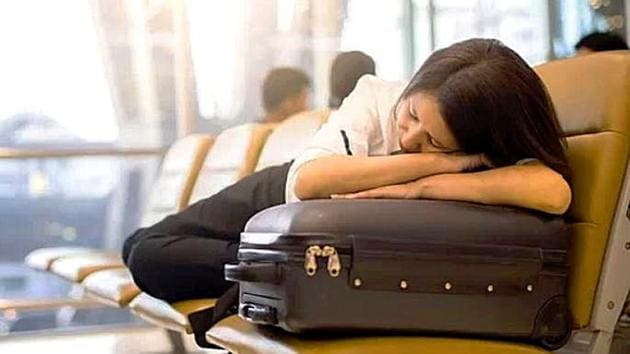
Beat Jet Lag: Essential Tips for Travelers to Adjust to New Time Zones
2 months ago | 5 Views
The contemporary landscape of international travel presents a unique challenge that can hinder even the most experienced travellers: jet lag. As our bodies endeavour to adjust to different time zones, we frequently encounter issues such as fatigue, mood fluctuations, and irregular sleep patterns.
Nevertheless, recent studies indicate that by employing effective strategies, we can considerably mitigate these effects and acclimatize more swiftly to new time zones. Jet lag arises when swift travel across time zones disturbs our circadian rhythm, which is the body's internal mechanism governing our sleep-wake cycle.
Dr Sarah L. Mednick, a sleep researcher and cognitive neuroscientist at the University of California, Irvine, remarked, "Our circadian rhythms are intricately aligned with our surroundings, and when we traverse time zones, we inadvertently disrupt this sensitive system. Gaining insight into how to manage this disruption can be transformative."

This disruption influences individuals in various ways, with its effects generally intensifying as one age. Fortunately, by comprehending the science of our body's timing mechanisms, we can adopt strategic measures to mitigate the consequences of jet lag.
The direction matters
In a discussion with Lifestyle, Varun Shetty, Co-Founder, Director, and High-Performance Coach at Invictus Performance Lab, stated, “A significant aspect of addressing jet lag is the direction of travel. Travelling eastward generally presents more difficulties compared to travelling westward. This discrepancy arises from the fact that most individuals find it simpler to remain awake longer than to go to bed earlier. When journeying east, you are effectively requesting your body to shorten its natural day, whereas westward travel allows for an extension of it.”
The power of pre-travel preparation
Varun Shetty recommended that for eastbound flights, individuals should commence their preparations a minimum of two days before departure. He emphasized the importance of gradually adjusting one's wake time by 30 to 45 minutes earlier each day. This change should be complemented by immediate exposure to bright light upon awakening, early intake of caffeine, and engaging in physical exercise within the first hour of rising. These three factors—light, caffeine, and physical activity—collaborate effectively to realign your internal clock.

Dr. Phyllis C. Zee, a prominent authority in the field of circadian rhythm research, highlighted the importance of preparation for travel, stating that it extends beyond merely packing luggage. She explained that it involves acclimating our bodies to facilitate a smoother transition into different time zones. Minor modifications to sleep patterns and light exposure can greatly mitigate the effects of jet lag.
Varun Shetty noted that travellers heading west generally experience a more manageable adjustment but can still gain from proper preparation. He recommended a strategy that includes postponing daily activities by 30 to 45 minutes, which encompasses wake-up times, caffeine consumption, and physical exercise. Furthermore, he suggested that exposure to bright artificial light during the evening can assist the body in adapting to later bedtimes.
The temperature minimum: Your circadian navigation tool
Varun Shetty emphasized the importance of recognizing a significant yet often overlooked element in the fight against jet lag: the temperature minimum. This refers to the moment within the 24-hour cycle when an individual's body temperature reaches its lowest point, which generally happens approximately two hours before their natural waking time. By strategically controlling light exposure during this vital timeframe, one can successfully realign their internal clock.

He recommended, "When travelling eastward, it is beneficial to seek exposure to bright light one to two hours following your lowest body temperature, as determined by your home time zone. In contrast, for westward travel, it is advisable to obtain light exposure one to two hours before reaching your temperature minimum. Adhering to this timing is essential; incorrect timing may exacerbate jet lag symptoms instead of providing relief."
Strategies upon arrival: Adapting faster
Upon arriving at your destination, certain strategies can facilitate your adaptation, as outlined by Varun Shetty:
Synchronize Meal Times: Adhering to the local dining schedule assists in regulating your internal clock. Additionally, fasting for 14 to 16 hours before your initial meal in the new time zone can further support your adjustment.
Utilize Portable Light Devices: In the absence of natural sunlight, bright light therapy devices (ranging from 5,000 to 10,000 lux) can simulate daylight, aiding in the recalibration of your circadian rhythm.
Minimize Blue Light Exposure in the Evening: The use of red-lens glasses or applications that filter blue light can enhance melatonin production, thereby promoting more restorative sleep.
Participate in Regular Exercise: Engaging in morning workouts in your new time zone helps align your body with the local time. Even a brief walk can significantly benefit your circadian adjustment.
Busting jet lag myths
It may be alluring to reach for a glass of wine or take a sleeping pill while on a flight; however, these immediate solutions frequently lead to adverse effects. Varun Shetty noted that “consuming alcohol can result in dehydration and interfere with your sleep, complicating your recovery upon arrival. Conversely, sleeping pills may induce drowsiness and further disrupt your circadian rhythm.” A more effective approach is to maintain hydration, ensure adequate light exposure, and engage in minor physical activities such as stretching or walking to facilitate a smoother adjustment to a different time zone.
Making jet lag a thing of the past
Varun Shetty stated, “Jet lag need not hinder your travel experiences. By understanding the science behind your body’s internal clock, you can take proactive measures to feel revitalized and prepared, regardless of your arrival location. Minor modifications, such as regulating your exposure to light, scheduling your meals appropriately, and utilizing travel-friendly technology, can significantly enhance your experience.”
For those who travel frequently—whether for business or leisure—effectively managing jet lag is not merely beneficial; it is crucial. These straightforward, scientifically supported strategies can assist you in overcoming jet lag, allowing you to concentrate on enjoying both the journey and the destination.
Read Also: Grishneshwar Temple: A Sacred Abode of Lord Shiva. WATCH LIVE STREAM!
Get the latest Bollywood entertainment news, trending celebrity news, latest celebrity news, new movie reviews, latest entertainment news, latest Bollywood news, and Bollywood celebrity fashion & style updates!
HOW DID YOU LIKE THIS ARTICLE? CHOOSE YOUR EMOTICON!
# Travelers




















